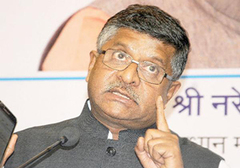
WASHINGTON - India's future as a technology powerhouse and its plans to connect India's 600,000 villages to the Internet through the Digital India programme were the focus of a roundtable of top American and Indian companies. Prime Minister Narendra Modi's Startup India initiative also came up at the roundtable with Indian Minister for Communications & IT Ravi Shankar Prasad hosted by the US-India Business Council (USIBC)...

at Cambridge, Massachusetts, on Friday. The roundtable was attended by USIBC President Mukesh Aghi and senior executives of American and Indian companies that included Google, AT&T, MasterCard, Facebook, American Tower Corporation, UST Global and iTech. USIBC comprises 350 top-tier US and Indian companies advancing US-India commercial ties. "Digital India provides an enormous investment opportunity for both global technology companies and startups from tech hubs like Boston and Silicon Valley," Prasad said.
"India is sitting on the cusp of a digital revolution," he said. "Whether it is big metropolitan cities or small towns, a well-connected India has the potential to not only usher in economic and welfare opportunities for its citizens, but also the global economic order." The Indian "government is taking every policy decision in a transparent, predictable and reasonable manner," Prasad said encouraging "American businesses to take advantage of the Digital India programme, and the growth opportunities in India." Prasad also outlined the progress that has already been made to implement Digital India programme and his priorities for the future. Aghi said, "Prime Minister Modi's directive to connect Indians across the country is a tremendous opportunity for both Indian and US companies alike." Noting that 85 percent of Indians still do not have access to the Internet, he said "the government could make it easier to obtain clearances to install cell phone towers." "IT infrastructure can be further expanded by lifting the ban on foreign satellite operators so they can provide spectrum in hard-to-reach areas." Dan Gupta of UST Global commented on the economic growth that can be spurred by the Digital India initiative and adoption of key technologies across sectors. "By some estimations, the Digital India initiative could help boost India's gross domestic product (GDP) by around $550 billion - upping its GDP by $1 trillion by 2025," he said. Sonny Khurana, CEO of iTech, praised the rapid strides in connectivity and the startup ecosystem under the current government.
"India is sitting on the cusp of a digital revolution," he said. "Whether it is big metropolitan cities or small towns, a well-connected India has the potential to not only usher in economic and welfare opportunities for its citizens, but also the global economic order." The Indian "government is taking every policy decision in a transparent, predictable and reasonable manner," Prasad said encouraging "American businesses to take advantage of the Digital India programme, and the growth opportunities in India." Prasad also outlined the progress that has already been made to implement Digital India programme and his priorities for the future. Aghi said, "Prime Minister Modi's directive to connect Indians across the country is a tremendous opportunity for both Indian and US companies alike." Noting that 85 percent of Indians still do not have access to the Internet, he said "the government could make it easier to obtain clearances to install cell phone towers." "IT infrastructure can be further expanded by lifting the ban on foreign satellite operators so they can provide spectrum in hard-to-reach areas." Dan Gupta of UST Global commented on the economic growth that can be spurred by the Digital India initiative and adoption of key technologies across sectors. "By some estimations, the Digital India initiative could help boost India's gross domestic product (GDP) by around $550 billion - upping its GDP by $1 trillion by 2025," he said. Sonny Khurana, CEO of iTech, praised the rapid strides in connectivity and the startup ecosystem under the current government.

 RSS Feed
RSS Feed
